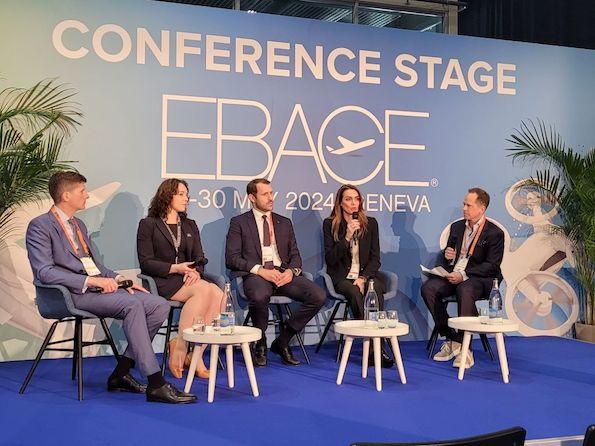
The EBACE 2024 panel included (from left): Marian Jancarik, Jetron founder; Leah Alexander, Duncan Aviation aircraft sales and acquisitions; Olivier Knutti, managing director of 88K; Meghan Dwyer, Guardian Jet European sales director; and Eric Lewin, AIC Global Solutions CEO.
GENEVA—The impact of the COVID-19 pandemic on the used aircraft sales market lingers on.
“There was an absolute runup in aircraft values in early 2021 through late 2022, and we started to see that normalize last year,” Leah Alexander, Duncan Aviation aircraft sales and acquisitions, said during a panel discussion at the European Business Aviation Conference and Exhibition here titled “Critical Issues for the Aircraft Sales Industry: The Evolution of the Aircraft Sales Professional.” “It seems to us now that the depreciation curve has returned to what we would have considered normal pre-2020. But the values across the board remain elevated.”
Market values have risen, and there is that “wait-and-see fear,” Meghan Dwyer, Guardian Jet European sales director, said during the panel discussion. “We knew [prices] had to go down—that they would go down, [but] we didn’t know how fast and how steep. I think there is a collective sigh of relief—that [values] are shallower down and that differentiation values are still normalizing.”
Business aircraft manufacturers have had record orders with two years of production backlogs. “But we’re starting to see some holes in that. . . . We do a lot of new buying, so that is very interesting for us,” Dwyer said.
Midsize and super-midsize jets sales are not slowing down, and there is a “red hot” market for late-model pre-owned jets in those categories—they are selling for higher prices than new jets with deliveries in 2025 and 2026, she noted.
“One thing that we can’t deny is turboprop and light jets,” Dwyer added. “Just like the other categories, market values went up, doubled even and [are] still up. It’s not going anywhere.”
The market is shifting from a seller’s market to a buyer’s market, said Olivier Knutti, managing director of 88K. “For me, you see differences in the transaction dynamics that transactions take more time. . . . I think we’re going back to what we knew before COVID. I think that the value is still high. The question is, if you correct for inflation over the past five years, is it still that high? If you look at the inflation, maybe a plane that was worth $5 million would be worth $6 million if you compensate for that. It’s hard to exactly know.”
Some post-COVID-19 buyers saw price runups and low inventory and decided to sit and wait for prices to fall.
“And those buyers, especially cash buyers, in an environment where interest rates have been rising for the past 18-24 months, they’re in a great position to take advantage of what seems to be normalizing market values,” Alexander said. “If they can secure an aircraft and close quickly, then they can retain the value compared to what they would have had 12-18 months ago.”
Despite the uncertainty of economic and political headwinds globally, especially in 2024, Alexander said she does not see a lot of pessimism in the market, “although things are certainly slower and more tempered,” she noted. “If you need a plane, you’re going to get a plane. Our types of buyers, our clients, have the connection to funding that’s needed.”
Some new entrants to aircraft ownership during the pandemic are now putting those aircraft back on the market, said Marian Jancarik, founder of Jetron. They may have made their aircraft purchase irrationally, without pre-purchase inspections, and their first maintenance bills and annual inspections are coming due. “The airplanes are getting back to the market right now because they can’t afford it, or they don’t want to pay for them,” Jancarik says.
Supply chain challenges as well as a shortage of trained maintenance technicians continue to buffet the market today, Alexander said.
Technology is also affecting the resale market as aircraft systems become more complex. Avionics, cockpits, communications and satellite systems are evolving quickly, Dwyer said, and that is having an impact on the value of aircraft receiving upgrades.
In addition, customers seek strong, fast, high-speed Wi-Fi networks and internet capabilities on their aircraft. But as aircraft become more connected, keeping them secure from hacking is increasingly urgent.
“There are people on this floor right now that have much more to say about the need for increased security around an aircraft’s network,” Alexander said of the EBACE 2024 exhibitors in the Palexpo convention center. “It is frighteningly easy, especially if you’re sitting in an FBO, many of which are relatively open-access—at least in the U.S.—and have lovely waiting areas, to see what sort of networks are broadcasting, and that includes aircraft. I’m not sure that the opportunity yet exists . . . and what the motivation is—obviously it’s a matter of both opportunity and motivation, and what sort of information you would be looking to gather. It might be time to have a deep conversation with the flight department, management company and the owners and users of that aircraft about the . . . information, which is obviously sometimes quite sensitive, especially [for] corporate jets [where] business is being conducted on board.”
As potential solutions, Alexander suggested perhaps requiring a virtual private network on board and verifying connection to it to ensure it is not a “ghost” network set up to steal information.
